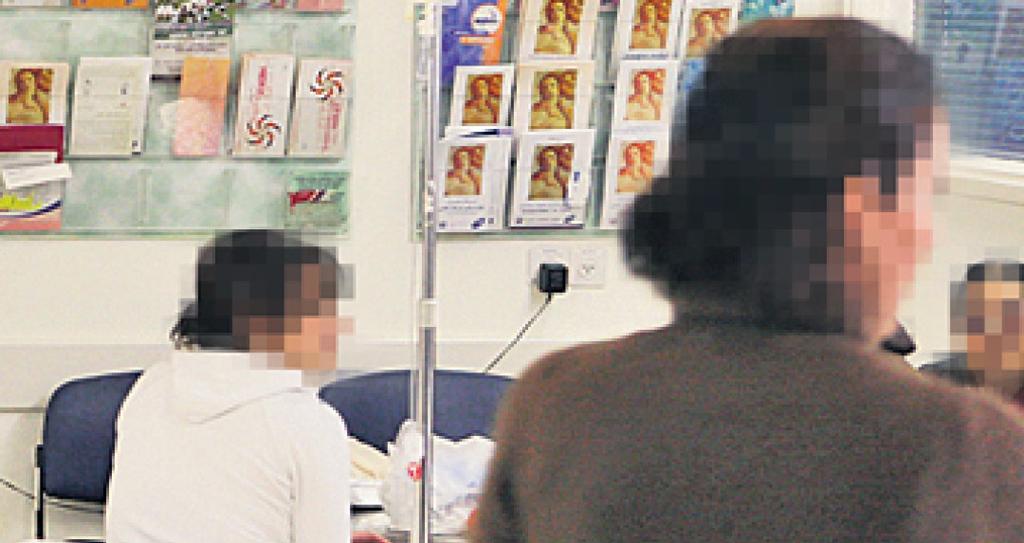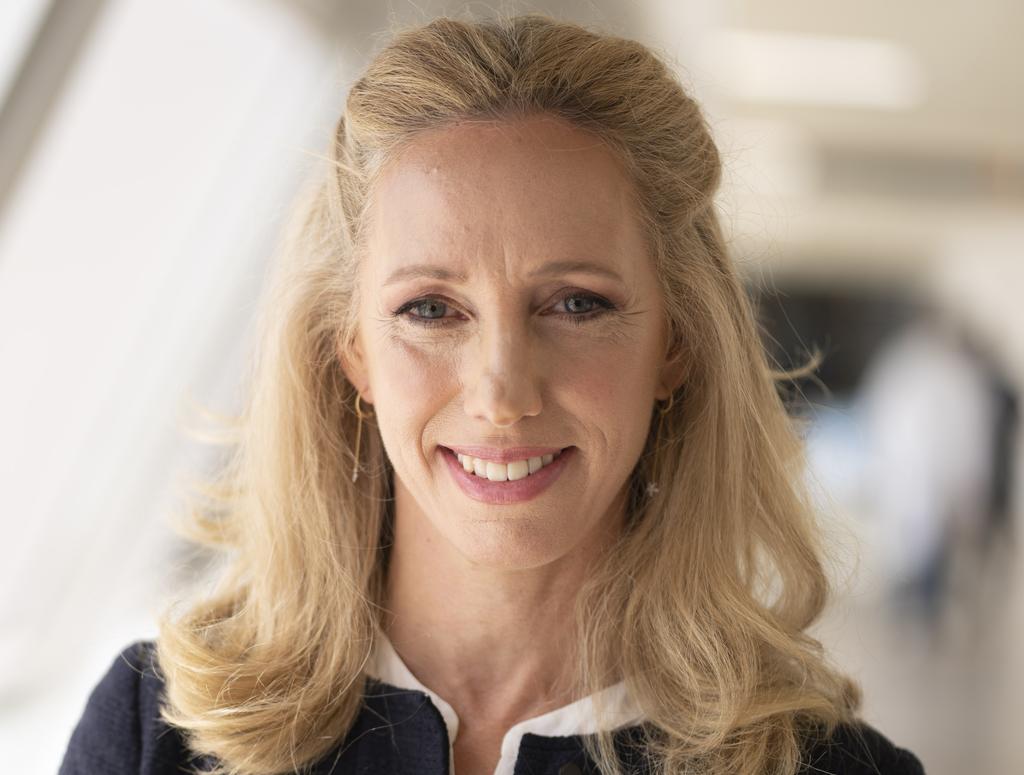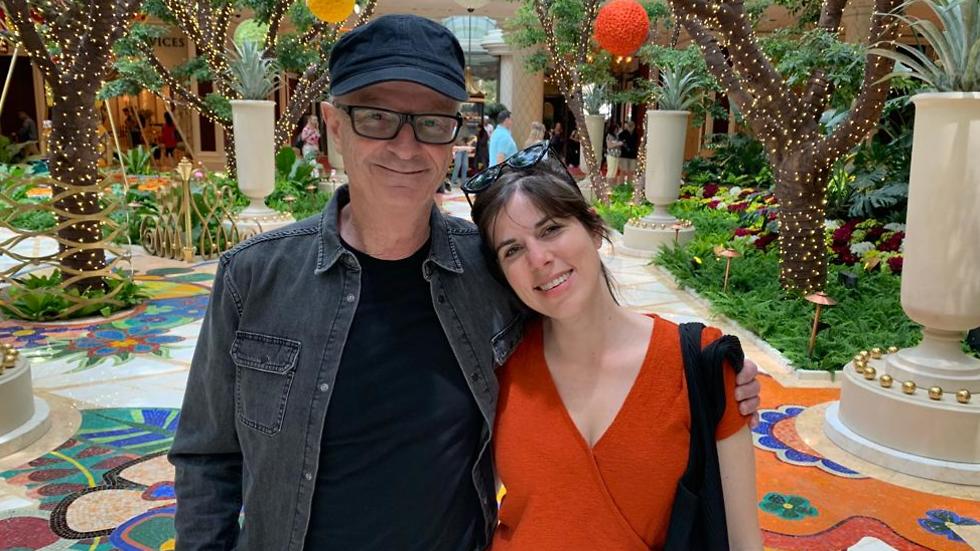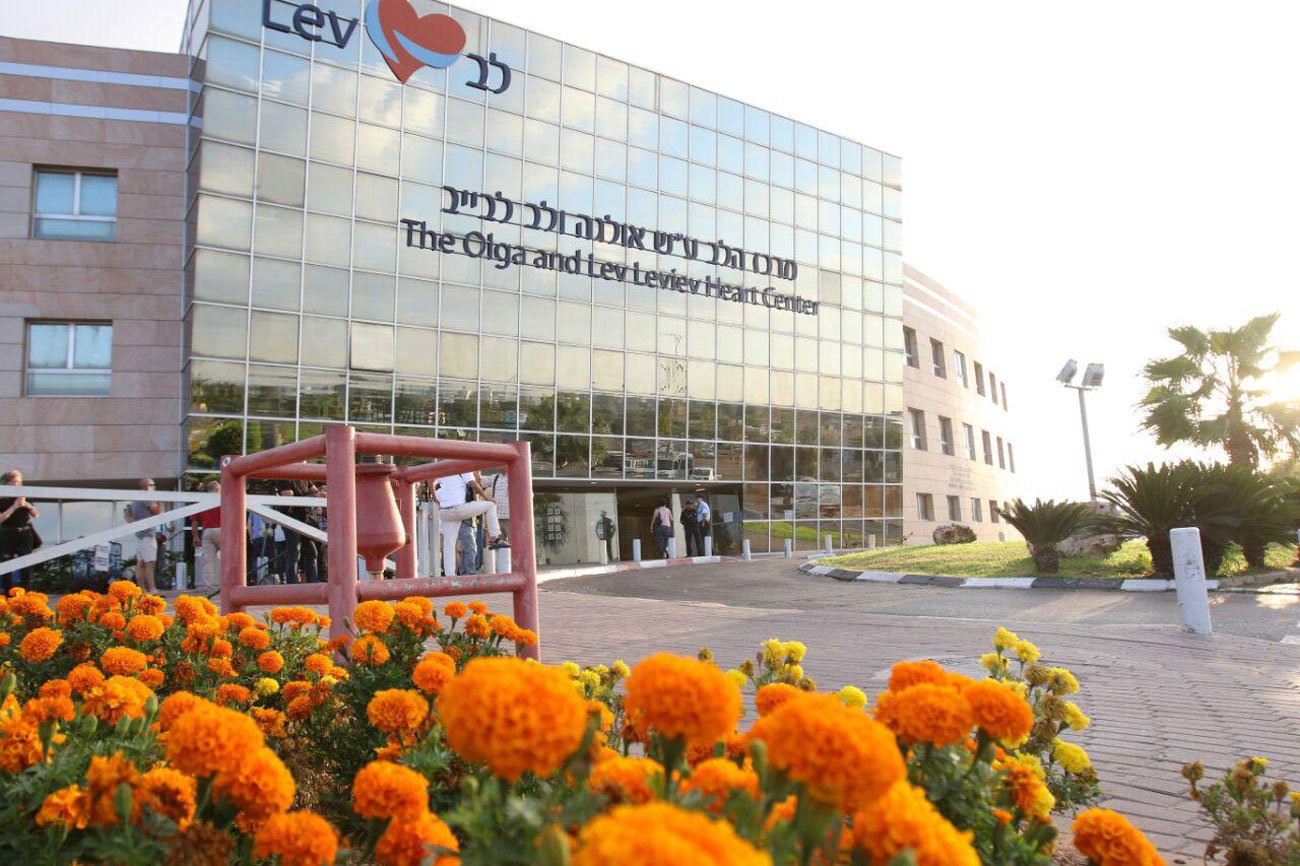When was the last time you Googled pancreatic cancer? I wouldn't recommend it. I mean, unless you really have to.
A year and a half ago, I Googled the words "pancreatic cancer," and my heart missed a beat. In that very moment, the process of letting go of my mother began.
She refused chemotherapy to treat her pancreatic cancer, and died five weeks later.
It's hard to imagine anything worse than the loneliness of just Google and I. I followed every possible link, searching in vain for a headline that would save my mother.
After Google, I picked up the phone and spoke to the doctors who took my call.
"What does your mother have? Pancreatic cancer?" Matter-of-fact tones soften, words become calculated, and they tread with caution.
"Pancreatic cancer?" an oncology nurse asks me. She does not suggest medication, she does not suggest treatment.
"Just make sure she doesn't suffer," she says.
Patients diagnosed with the disease and their families are left to cope with a demoralizing prognosis.
"You go online and find that pancreatic cancer and death are synonymous," one patient said.
A New York Times article published earlier this year reveals that pancreatic cancer is the third leading cause of cancer deaths, after lung and colon, and it is on track to overtake the latter within a decade.
There is no real method for early detection, so usually when the cancer is diagnosed it's a terminal, metastatic, stage four tumor (for those who are lucky enough not to know the jargon —there is no stage five).
Early discovery of pancreatic cancer is so rare, largely because it is almost impossible to detect the symptoms.
The classic discovery of pancreatic cancer usually happens as a result of visible jaundice (yellow skin and eyes). But there are other symptoms - high blood sugar, nausea, vomiting, sudden weight loss, fatigue and weakness, dark urine, sharp upper or mid-abdominal and back pain, loss of appetite and feeling full.
But which of us has never experienced one of these things?
Battling loneliness
In Israel, statistics show that pancreatic cancer sufferers only amount to 3% of the total number of cancer patients.
But if you talk to people in Israel, it feels like an epidemic. In the coming year, 805 men and women will lose their lives to pancreatic cancer.
Only about 15-20% will be diagnosed early enough to have the tumor surgically removed; 80% will be diagnosed after the disease has already metastasized- of those, only 8% will survive 5 years after diagnosis.
One of the less talked about side-effects of this cancer is loneliness and the helplessness felt by patients and their families when trying to navigate the relevant information, support and help.
They often describe it as being given a death sentence with no prospect of hope.
In August, the new Pancreatic Cancer Association was founded in Israel for the first time. Behind this project, together with a team of women determined to contribute and raise awareness, stands Dr. Talia Golan of the Sheba Medical Center in Tel Hashomer.
Dr. Golan is a world-renowned oncologist and researcher in the field of pancreatic cancer, and is a director of the Phase I clinical trials unit at Sheba’s Pancreatic Cancer Center.
The project started when Dr. Golan was approached by the World Pancreatic Cancer Coalition, a network of pancreatic cancer advocacy groups from around the world, about the creation of an organization in Israel.
After talking to the women who are now the founders of the organization, Dr. Golan reached out to her colleagues at medical centers across Israel.
"I want to bring to your attention to an exciting initiative which is underway to establish an Israeli Pancreatic Cancer Association," she wrote.
"I see us all as members of one community, working tirelessly to improve the lives of our patients and their caregivers. [We want] to establish a nationwide NGO that won't be exclusively affiliated with any one hospital, but will speak to our joint mission.”
This was an extraordinary, almost historic step, taking into account the competition among hospitals in Israel when it comes to treatment, research and funding.
Dr. Golan's message was one of pure good, born of a genuine desire to give Israeli pancreatic cancer patients the kind of hope and research they deserve.
A painful connection
Since August, Dr. Golan was joined in her quest by patients, caretakers, family members, and medical professionals from various hospitals who wanted to take part in the initiative.
The Association invites everyone to participate in the fight against pancreatic cancer.
According to its founders, the NGO has four goals:
1. To raise public awareness of the disease and symptoms in Israel
2. To provide accurate and up-to-date information about pancreatic cancer, and treatments and clinical trials available in Israel
3. To help fund research on pancreatic cancer
4. To provide support to patients and their families
The founders of the Israeli Pancreatic Cancer Association have a shared pain. Each of them, in their own way, has experienced the destructive impact of this cancer first hand.
Physical psychotherapist Tali Segev is the widow of Joseph Smadja Segev, who lost his life to pancreatic cancer just last year; Pamela Peled, a reporter and lecturer, has lost both her beloved mother and husband to the disease; Maria Reitses-Gurevitch is a cancer researcher; Sally Zisman acts as a case manager for patients with the cancer; lawyer Yael Bachar's father was diagnosed with pancreatic cancer and underwent successful surgery; occupational therapist Ranit Artzi is the caretaker for her husband who was diagnosed this year.
The youngest of the founders is 29-year-old Maya Raphael, an Israeli student in London whose father Chemi was diagnosed with metastatic pancreatic cancer about a year ago.
"When you Google metastatic pancreatic cancer, you become convinced that there are no survivors," Raphael says, "but that's just not true."
A year ago, Maya's life drastically changed when her father was diagnosed with stage four pancreatic cancer. At the time, she lived in Jerusalem with her partner and worked at the Israel Democracy Institute, a prominent think tank.
"I looked it up on the internet and my whole body froze. It read that stage four pancreatic cancer like my father's meant he had between a month and six months to live," she says.
"At that point, I stopped everything. I left my job and went back to live in Jaffa to be close to my parents. I just tried to gain a better understanding of the illness and possible treatments, and tried to help my family - and myself - cope with this unimaginable situation in which we found ourselves.”
What is the NGO's role?
We're still in the early stages, but the hope is that much like the more established NGOs for pancreatic cancer, we will publicize significant findings from studies, new clinical trials, and tell the stories of patients and survivors - personal stories that undo the stigma surrounding pancreatic cancer with real-life human experiences.
How did you discover your father had pancreatic cancer?
“My parents called me one day sounding concerned and asked me to come home for the weekend. My dad didn't have any health problems; he exercises, doesn't smoke, doesn't drink and is not overweight. I knew he could be a bit of a hypochondriac, so I didn't think too much of it.
"That Saturday, he hugged me and told me he loved me. Towards the end of the visit, I knew something was wrong. And when my sister, who was living in Spain at the time, called to say that my parents had asked her to come home, I realized it was serious, but I still didn’t imagine the worst.
"My dad came to visit me in Jerusalem and then took me on his motorcycle to Tel Aviv. We sat in a café, and there he told me for the first time he had pancreatic cancer. He had a hard time telling me, yet I knew what really tore his heart out was the thought of telling my brother - he had just joined the army, and they have a unique bond.
"I immediately went to Google, and when I typed 'pancreatic cancer' the first search option was 'death sentence,' and the second was 'survival rate of one to six months.'"
What went through your mind at that moment?
"After the paralyzing shock, I realized that I had to support my family in every way possible and that having a breakdown was just not an option.
"In retrospect, he had all the symptoms, but the last thing that comes to mind is terminal cancer. My father wasn't yellow and so it took a long time to diagnose.
"He suffered from abdominal pain and went to see the doctors; they thought it was perhaps acid reflux but nothing more. Then he lost his voice and became hoarse, but who connects that to cancer? At worst, we thought it was bronchitis.
"His blood sugar levels had gone up so he cut down on sugar and he started to lose weight. We now know that this was a clear symptom, but then we thought that he had lost weight because he had cut down on sugar.
"It was only after he described to the gastroenterologist a pain that moved from the center of his abdomen to his sides like a belt that it raised a red flag and he was sent for an ultrasound. There they found what looked like a mass in his pancreas and everything changed.
"We are a very optimistic family. Although we were told it was pancreatic cancer, we still hoped maybe they had got the diagnosis wrong, or maybe he had a less aggressive type of pancreatic cancer, like the one Steve Jobs had," Maya says.
"When the final biopsy results came back, that's where I really lost hope. It felt like any silver lining I had held on to until then just vanished."
Yet newfound hope arrived when they met Dr. Golan, one of the lead researchers in a breakthrough study published this year. The study found that Lynparza, a biological drug previously associated with ovarian and breast cancer, doubled the progression-free survival rate of patients who have a BRCA mutation.
Some of Dr. Golan's patients with metastatic pancreatic cancer who matched the criteria for this treatment are now three-year survivors.
"My father did not fit the criteria for this line of treatment," says Maya. "But Dr. Golan is truly holistic in her approach to my father's illness. Not only does she take into account the unique aspects of his cancer, she also focuses on the unique qualities of his personality.
"She does not treat my father simply as her patient, but as her partner in the fight against cancer."
Despite it all, Maya's father says this year was one of the best of his life.
"We spent a lot of time together as a family, and enjoyed being with one another. This year, I got married and one of the happiest moments of my life was having my father drive me down the aisle on his Harley Davidson."
Raphael donated a percentage of the money she got for her wedding to help the pancreatic cancer ward buy equipment that would improve and personalize treatment.
Pancreatic cancer- silent killer or silent culture?
November is Pancreatic Cancer Awareness Month. Known as the "silent killer," the disease almost impossible to detect and extremely resistant to treatment.
For reasons that are still unknown, the number of people diagnosed with this cancer is rapidly increasing and as yet, there is no truly effective treatment.
"This cancer must be taken more seriously," says Maya. "Pancreatic Cancer is expected to overtake others to become the second leading cause of cancer deaths by 2020, yet no one is speaking about it."
Abraxane, a chemotherapy drug for metastatic cancer my father and others are prescribed every two weeks, costs NIS 2,500 ($723) per treatment in Israel. Why is this drug still not included in Israel's National Health Insurance basket?"
This year USPSTF, the US Preventative Service Task Force issued a statement stating that the chances of detecting pancreatic cancer are so low that doctors are not even trying.
Seventy-five percent of patients die within a year of diagnosis, and only one in every 10 will live for five years or longer.
"This cancer is not anyone's radar, including GPs," Maya says. "Any patient who goes to a GP with a mole that has changed color or a lump in her breast will immediately be taken seriously. No one would tell them they were suffering from depression or just a virus. We must make the invisible, visible. Early detection and surgery could give patients another five years."
What do you want to tell people about pancreatic cancer?
"I want to tell them that beyond the horrors and statistics associated with it, people are finding innovative ways to fight this cancer emotionally and physically every day. And it is their stories which can make this cancer be human and heard."
A light at the end of the tunnel, even if only for some
"I wanted to work in a field where you can form a real connection with patients," says Dr. Golan. "Oncology is a difficult choice, but I am not afraid of having difficult conversations."
For years she has been volunteering at the Pancreatic Cancer Action Network in the U.S., traveling across the world to attend conferences and participating in weekly conference calls in the middle of the night.
"I love to help, to be involved in research. My approach to medicine is global, and when I see new developments I want to bring them to Israel."
For years, people had been asking her to found an NGO but it was impossible with her busy schedule. One minute of her time can be worth six months of life for a patient and commitment to them comes first.
"I was happy to help promote the cause, but I am leaving the work to the founders of the NGO. Of course, they have my full cooperation."
Just this year you led a groundbreaking clinical trial for pancreatic cancer, what is your message to patients?
"There is a subgroup of stage four pancreatic cancer patients with BRCA mutations, which make up 7% of the world's population and 15% of the population in Israel.
"When you replace their chemotherapy regimen with a targeted biological treatment, you can stop the progression of their illness for a substantial period of time. This is the first time a phase three pancreatic cancer trial has achieved such findings.
"There is still much to be done when it comes to studying this disease, but this year's breakthrough findings have created a horizon of hope, even if it is for a small group, this is a significant achievement. Quite a few patients have told me; we know it won't save us, but it gives hope to those who come after us."
Can you assure a patient who comes into you with a stage four diagnosis that it is not a death sentence?
"I am not a prophet, and I do not know when a person's time will come. But I can tell you I have witnessed people who survive against all odds - it's rare but it happens.
"I always assure patients that at any point in time, I will honestly communicate their situation to them. Reality is a given, but there is always hope in the heart.
"Sometimes we continue with a different path of treatment and sometimes we talk about how to say goodbye. Today, thanks to new drugs and experimental treatments, 10%-15% of patents live significantly longer. "
Do you prepare patients for saying goodbye?
"I facilitate open and honest conversation and always try to consider the patient's personality and the point they're at between this world and the next. When I need to, I initiate the most difficult conversations. Only yesterday I had such a farewell conversation with a patient I have treated for two and a half years. They stopped treatment in March of this year, wrote preliminary guidelines in preparation for death."
What needs will this NGO address?
"When people enter my room, I often see their loneliness, the unprofessional ways in which information has been passed on to them.
"I don't want anyone from the north to the south to feel such loneliness, especially in the days immediately after receiving a diagnosis.
"I want patients and their families to have an accessible and professional source of support with centers all over the country to provide accurate information, explain their options and offer support. All this is crucial, especially after having received the hardest of news."
Perhaps part of a speech Dr. Golan recently delivered at a pancreatic cancer conference says it all: "My role as an oncologist who treats patients with pancreatic cancer truly is difficult. I have conversations with patients and their families who are faced with a disease that has a median survival rate of mere months.
"The moments of grace are limited. From an early age, I was determined to find an international organization that would allow me to engage with personalized medical care at the highest level. I have always believed the concept of personalized medicine to mean creating a meaningful relationship with my patients whilst maintaining an environment of the most advanced research.
"One of the key lessons I have learned as an oncologist is to see my patients as partners and empower them. Only together can we create change. I love my role as a doctor and I truly love my patients."





